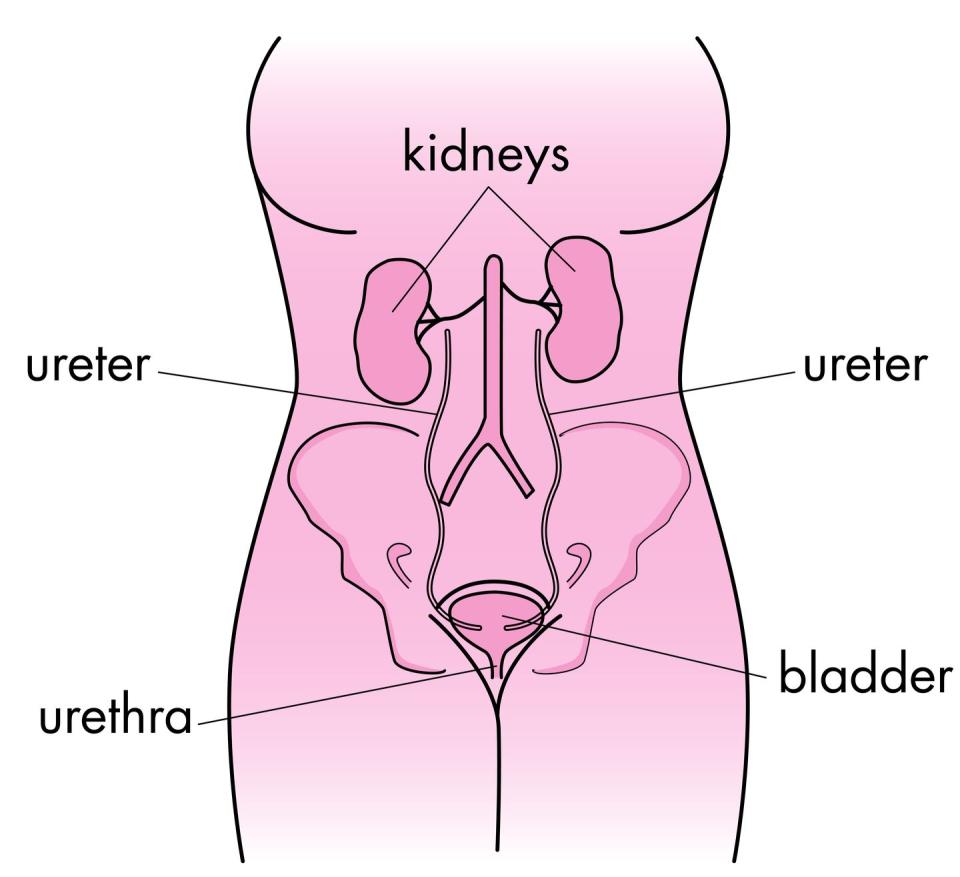The Symptom-Googler's Guide to Actually Getting Rid of a UTI

If you’ve ever had a UTI before, it’s easy to feel your whole body yelp when you first feel that burning when you pee, like "not this again." If you’ve never had one, it’s jarring to be like, “why tf does something I do all the time suddenly feel like it’s killing my body one drop at a time”. Either way, the feeling of burning when you pee can be unpleasant, anxiety-inducing, and a sign that you gotta shlep on over to a doctor’s office for a consult instead of worst-case scenario spiraling and trying to diagnose it yourself. But still, between the doctor’s office visit you’ve booked (you did book one right?) and now, here’s some v. helpful info on how to better manage your symptoms in the meantime.
Like hi, why does my clitoris burn when I pee? It's because your clitoris is really anatomically close to your urethra, so inflammation in your urethra from a UTI could cause your clitoris to burn, explains Dr. Heather Irobunda, an OBGYN in NYC. What TF causes UTIS (sorry but "sex" is simply not specific enough!) How to prevent UTIs, how to treat them, and how to not lose your mind in the process.
Common Q's If You're Dealing with a UTI RTFN
First off, do I really have to see a doctor? Can’t I just buy one of those drugstore UTI test kits?
You might be tempted to just skip the doc altogether when you see those test kits at the drugstore, but they really shouldn’t replace an actual doctor’s visit for several reasons. One, they’re not 100% accurate, explains Dr. Tamika Cross, MD, an OBGYN in Houston, TX. Certain medications like phenazopyridine (which is often used in medications to soothe UTI symptoms) or even food like beets could potentially cause test results to be inaccurate, says Dr. Cross.
Another thing to keep in mind is that these test strips don’t give any info about the type of bacteria causing an infection. “Different bacteria may need different types of antibiotics to treat them,” says Dr. Irobunda. Also, “UTIs don't often go away without treatment,” adds Dr. Irobunda, meaning, you’ll still need to see a doctor to get treatment for the problem.
At your actual doctor’s office, they’ll do a urinalysis (similar to the OTC test strips), but they’ll also send the urine off for a urine culture, which is something that cannot be done over the counter, explains Dr. Vonne Jones, MD, FACOG, an OBGYN in Houston, TX. This testing will show the exact bacterial source, so you can get treatment with proper antibiotics. “If left untreated, the bacteria can ascend into the kidney and cause a kidney or blood infection,” adds Dr. Vonne. Not something you want to mess with. Dr. Vonne also underlines how it’s important to take antibiotics as prescribed to decrease the risk of bacterial resistance.
Ultimately, it’s fine to toss a kit in your purchases just as a starting off point, but you should still see a doctor to double check and be safe.
Ok ok, fine you convinced me, I booked a doctor’s appointment. In the meantime, what can I do to make this hell-on-earth-in-my-pants a little better?
To soothe a UTI at home, you’ll want to focus on keeping very, very hydrated. Even though peeing sucks so hard when you have a UTI so it’s probs not instinctual to like, make yourself pee even more, you have to. But, as Dr. Irobunda explains, drinking water can help because it can dilute your urine, making it less likely to irritate your bladder and your urethra.
Cranberry juice might also help for some women, Dr. Irobunda points out, as cranberries have a chemical in them that makes it hard for bacteria to stick to the bladder, which can help some UTI symptoms.
You can also invest in a peribottle, says Dr. Irobunda, which is basically an angled $16 spray bottle you can fill with water and spray on your urethra when you urinate. The peribottle can also help dilute the urine if you notice burning as it comes out.
Dr. Cross also emphasizes the importance of seeing your doctor sooner rather than later for treatment for the ultimate peace of mind and comfort. The sooner you can get on antibiotics, the better you and your body will feel.
I’ve seen those OTC pills at the drugstore too, can I just take those and skip the doctor?
Nope. What you’re likely seeing in those OTC pills is something that contains phenazopyridine, which can soothe any burning during urination, but is not an alternative to antibiotic treatment, as Dr. Cross mentions.
Another thing to keep in mind, Dr. Irobunda says treatments that contain phenazopyridine will probably turn your urine bright orange, and as Dr. Cross mentioned before, could potentially cause an incorrect diagnosis for an at-home UTI test. Ultimately, you gotta see the doc, but in the meantime, it’s fine to try those for pain relief — just make sure you also tell your doc what you’ve been taking so they can take that into consideration when looking at any diagnostic work.
Urinary tract infections, or UTIs, are infections that occur when bacteria enters the urinary system. The urethra, the tube responsible for carrying urine to the outside world, is located between the clitoris and the vagina, which unfortunately means it’s perfectly positioned to receive errant bacteria when you’re wiping in the bathroom or having any kind of sex.
When pathogens reach your bladder, warm urine unrolls its welcome mat, inviting the bad guys to colonize and trigger an infection, according to Craig Comiter, M.D., a professor of urology and obstetrics and gynecology at Stanford University. Left untreated, the infection can go away on its own, but in rare cases, it can also progress to a kidney infection, he says.

Although men get UTIs too, women are extra susceptible. "It has nothing to do with cleanliness — it's simple anatomy," Dr. Comiter says, citing the proximity between the anus and vagina, a moist environment where bacteria tend to thrive. The average woman’s urethra is only about 2 inches long, he explains, while the male urethra extends roughly 8 to 9 inches, from the head of the penis all the way back into their body.

While UTI symptoms can vary, they tend to center around urination. From a fiery sensation during peeing to the near-constant need to go, UTIs can feel to some women like actual hell.
Some classic UTI symptoms also overlap with other conditions. Start here to get a sense of what might be going on. (Then consult a doctor IRL — the internet doesn't have an M.D.!)
Dr. Comiter says the constant urge to pee or an increase in urination frequency could result from inflammation, an immune response to infection. Your urine may also develop a strong smell or get cloudy or foamy — evidence of excess protein in the urine. Keep a list of these symptoms to share with your doctor.
If it also burns when you go, it could be a UTI… or, if you used spermicide, it could be urethritis, says Suzanne Fenske, M.D., an ob-gyn and assistant professor of obstetrics, gynecology, and reproductive sciences at Icahn School of Medicine at Mount Sinai. In the future, you might want to avoid spermicide and use a different form of birth control. In the meantime, an antibiotic prescription could help.
In older adults and smokers, recurring pain when you pee that's not resolved with antibiotics could signal bladder cancer — but young, otherwise healthy women have little reason to worry, Dr. Comiter says. So don’t go down the cancer rabbit hole before seeing a doc, okay?
If clumpy, cottage cheese-like discharge accompanies burning during bathroom runs, you may have a yeast infection. "If urine gets in the vagina and there's an overgrowth of yeast there, that could also cause burning," Dr. Comiter says, adding that doctors rarely mistake yeast infections for other issues.
Oozing vaginal discharge, on the other hand, coupled with sores or bleeding, could flag a sexually transmitted infection. Luckily, many STIs can be treated with an antibiotic or antiviral treatment, so you know the drill: Get thee to a doctor.
Bacterial infections can spread from the bladder to kidneys, where they can cause more severe symptoms like fever, chills, nausea, back pain, and/or vomiting. It's rare, but they do happen — most women know a friend of a friend who’s wound up in the hospital that way. On the off-chance a UTI does become a kidney infection — which is a greater possibility during pregnancy — a 10- to 14-day course of antibiotics should take care of things. "Kidney infections can strike quickly, but they’re 100 percent treatable," Dr. Comiter says.
Only recurring kidney infections (which can lead to scar tissues) or infections that go untreated (which can lead to sepsis) can result in long-term damage. "This is rare in young and healthy patients," says Dr. Comiter, who urges patients to contact their doctors anytime UTI symptoms worsen.
Because infection and inflammation go hand in hand, and the capillaries in the inflamed walls of your bladder can break and bleed every time an infected bladder contracts to pee, your UTI may be marked by blood in your urine, he says. It can be pretty scary to see blood in the toilet bowl when you’re not expecting it (or even when you are, tbh), but it’s not an abnormal symptom. Regardless, bring it up with your doctor.
UTIs can strike without any sex at all: Some women are born with receptors in the vagina, urethra, and bladder that attract harmful bacteria, while others — particularly women who've suffered from UTIs before — may lack the healthy vaginal bacteria that fend off infectious intruders, according to Dr. Comiter. If you douche — a bad idea since the vagina cleans itself and is easily upset — you may impair the region's natural immune system, which also leaves you more vulnerable to infection.
"UTIs can get better on their own after 10 to 14 days," Dr. Comiter says of infections that impact the bladder (not the kidneys), "but it's going to be a miserable 10 to 14 days, and we can get you better faster."
In most cases, once you begin taking the right antibiotics, you can expect relief within 24 to 36 hours of starting the three- to five-day course, standard practice for treating a UTI that only affects the bladder. (Beware: You may incur side effects like an upset stomach or diarrhea.)
If the meds you're given don't make you feel better, relay this update to your doctor just in case you need a different antibiotic. Your doctor can figure out the best course of treatment with a urine culture to determine exactly which bacteria are present.
If there's any doubt about the cause of an infection that recurs or worsens, your doctor may perform an ultrasound to rule out kidney and bladder stones or anatomical causes, Dr. Comiter says.
Then there are the women who get recurring UTIs; some may get a few a year. If you follow common-sense preventative methods (like peeing before and after sex and wiping from front to back — more on that below) and still suffer from more than two UTIs in six months or three in one year, there could be other factors at play: Research suggests that sex, use of spermicidal products, having your first UTI at an early age, and a maternal history of UTIs can increase your risk of recurring infections. Diaphragm use and new sexual partners can also contribute, according to the American College of Obstetricians and Gynecologists. Or, it could be that your last infection was never fully treated, says Dr. Fenske.
If you’re suffering from nonstop UTIs, have a long talk with your doctor. She might suggest taking a low-dose, prophylactic oral antibiotic after every penetrative sexual encounter, or changing up your birth-control methods. Oftentimes, Dr. Fenske says, all you need is a another urine culture to ensure the infection is being treated correctly and has actually cleared.
If there’s one thing every single woman knows about UTIs, it’s that you can avoid them by jumping out of bed as soon as sex is over and peeing. But that's just the half of it.
Urinating right before sex (or foreplay) can also help you sidestep infection. "If your bladder is empty, there's no urine for bacteria to infect," Dr. Comiter explains.
There are other ways to help prevent UTIs. Always wipe from front to back, for one — yep, that’s why your parents taught you to do it that way. As for a thing your parents might not have harped on: Avoid vaginal intercourse after anal sex (or anal play), a surefire way to plant bad bacteria where it doesn't belong, according to Dr. Comiter. When the action happens out of order — hey, you can't plan everything! — have your partner change condoms and wash his penis and hands, then cleanse any toys you've used. (You can also school him on best sexual practices so he doesn't accidentally contribute to the problem.)
Beyond the bedroom, Dr. Comiter recommends avoiding sex in hot tubs, where bacteria can flourish. (Which is probably just good etiquette anyway.)
By now, you should know the best way to alleviate a UTI: Hightail it to your doctor’s office, where you may get an antibiotic Rx. In the meantime, instead of curling up in fetal position and gritting your teeth, pick up AZO, an over-the-counter pain killer. "It doesn't cure the infection, but it stops the pain with a surface anesthetic that gets concentrated in your urine and coats the bladder," Dr. Comiter says. Do be warned: These meds give your pee a neon glow — and the same goes for Pyridium, the prescription version of AZO, which has a similar side effect. "It's the same idea, but the pigment is bright orange," he says.
Although neither AZO or antibiotics will prevent UTIs, some science suggests that cranberries may support the cause thanks to their antimicrobial properties, but the evidence is mixed — particularly when it comes to commercial cranberry juices, which tend to contain more sugar than fruit. "It probably doesn't do anything," Dr. Comiter says. "But the more you drink, the better, since the more you pee, the more you'll flush bacteria out." (For more on the cranberry debate, click here .)
To that end, amping up liquid intake in general can help you beat a UTI, according to Dr. Comiter. Any fluids can help — except for alcohol, since it's best to avoid booze while taking antibiotics.
Because vitamin C can make urine more acidic, which suppresses bacterial growth, supplements and food sources like citrus fruits are also thought to fend off infection, according to Dr. Comiter — but again, evidence is inconclusive.
Moving on to the dairy aisle, Dr. Comiter says that while more research is needed, yogurt, which contains probiotics, can help promote normal bacterial flora in the vagina and amp up your defense against infection.
There now. Don’t you feel better already?

You Might Also Like

